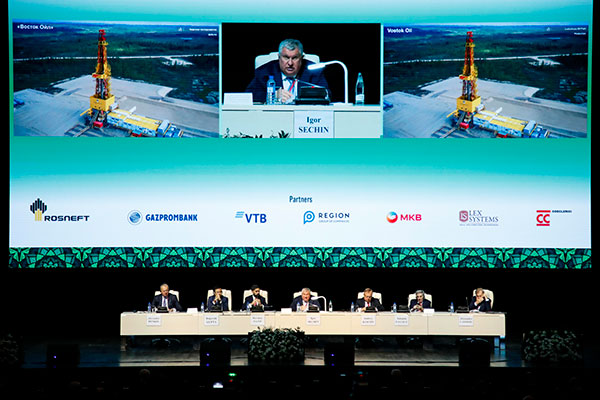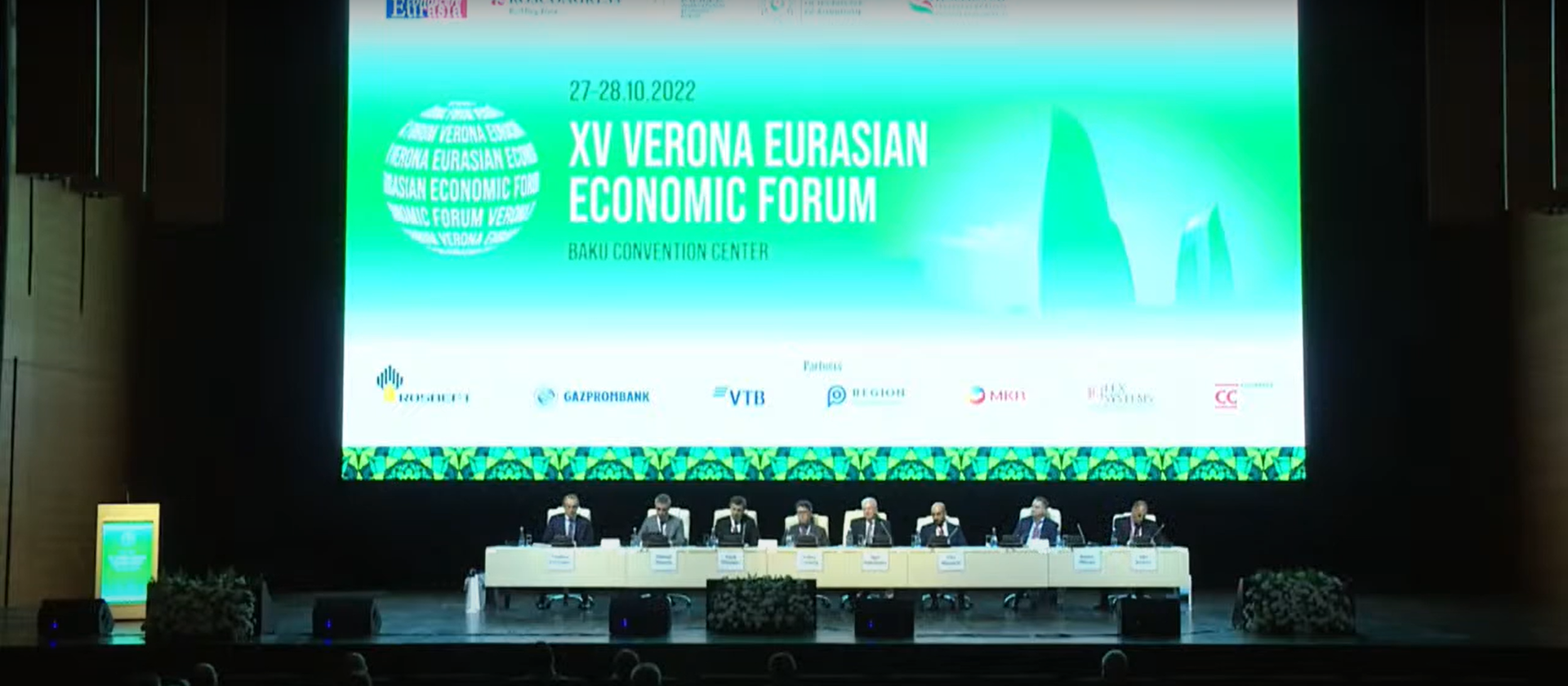CAIRO - 8 November 2022: The 15th Verona Eurasian Economic Forum took place in Azerbaijan, at the Baku Convention Centre, on Oct. 27-28, focusing on a key topic which is «Eurasia on its Path to a New Geopolitical, Social and Economic Order: Transition to a New, Human-Centered Economy.»
The purpose, which is organized by the non-profit Association Conoscere Eurasia and the Roscongress Foundation, with support from the Ministry of Economy of the Republic of Azerbaijan, is to promote business dialogue in Greater Eurasia.
The agenda of the Forum included topics such as the transition to a multipolar world order, the new reality for commodity and energy markets, natural gas as a key resource for the economy of the future, forms of industrial and commercial cooperation in a changing world, models for financing and payment mechanisms in a global context, the role of the technological revolution in the development of the economy, and ways to ensure food security and promote the development of the agro-industrial sector.
Azerbaijani Economy Minister Mikayil Jabbarov, Russian Economy Minister Maxim Reshetnikov, Azerbaijani Deputy Prime Minister Shahin Mustafayev and Russian Deputy Prime Minister Alexei Overchuk, as well as a number of other high-ranking officials, participated in the event.
The participants discussed issues of mutual economic cooperation, transport and economic issues, as well as the challenges facing countries, global problems and climate change, and the role of ‘green’ technologies and digitalization in their solution.
During the first day of the forum, two special sessions were held, the first entitled,”The new reality of commodity and energy markets,” and the second was about, “Azerbaijan – a major hub for Eurasian economic cooperation and its prospects for relations with the EU and EAEU.”
As for the first special session, global commodities and energy markets clearly mirror the rapid geopolitical changes taking place around the world. The speakers tackled during the session What used to take years and even decades is happening before our eyes, literally in real time. What is the new reality emerging from these processes? What will these markets look like in the long term?
The second session was about Azerbaijan’s capital which hosted the Eurasian Economic Forum in 2022, with the aim of contributing to the business dialogue in Greater Eurasia. Baku’s choice is no accident. By doing so, the country reaffirms its essential and meaningful international presence, amplified by its own great trade and economic potential. Participants in the session elaborated on their vision of the prospects and opportunities for Azerbaijan and its growing economy in a dynamically changing world.
Following the two special sessions, the first session of the forum kicked off under the name of “from a monopoly crisis to a multipolar world order.” The session offered answers to questions of “What are the main trends of these processes and their possible outcomes? Is it only a crisis of a unipolar world order that may return in a renewed form, or is multipolarity inevitable?
There are profound changes taking place in the world order.”
According to the forum data, there are many different assessments of what is happening.
The second session was about Natural gas – a key resource for the economy of the future. In today’s environment, natural gas has become the fuel of the future. It has several combined advantages. In a changing environment, what are the prospects for the development of the natural gas industry and the use of methane in power generation, industry and utilities? What are the investment and logistics prospects for the industry?
During the session, Igor Sechin, Chief Executive Officer of Rosneft Oil Company, presented the keynote speech “The Flood on the Energy Market.
In his speech, Igor Sechin remarked on the end of the “era of plenty” and the beginning of the crisis of globalization. The head of Rosneft called Europe, which had lost its identity, “the primary victim of U.S. policy” aimed only at extending its own hegemony as far as possible. “However, the world has changed for everyone, including the United States,” Igor Sechin said.
The head of Rosneft also spoke about the Company’s operational successes, such as the launch of the major Kharampur gas project, which had been commissioned on time despite a lack of funding from partner BP, and a significant increase in oil reserves at the Company’s flagship Vostok Oil project.
According to the head of the Russian oil giant, "The Vostok Oil project could make it possible to meet any growing demand from the markets of Southeast Asia, India and China. After making the strategic decision to "turn east", Russia is systematically increasing the supply of energy resources to the Asia-Pacific region. In 2021, Russian oil exports to China and India exceeded 80 million tons ",
The first day of the forum was concluded by a session entitled, “Diplomacy in the modern international context in the service of interaction and cooperation.”
The forum’s second day started with a session entitled,”Modern cooperation in industrial and commercial cooperation”. The discussion was about increasing geopolitical tensions and pandemic-induced restrictions on cross-border activities are radically changing international cooperation chains that have been built up over the decades. The new reality shows both the deep interdependence of markets and regions and the need to reorganize cooperation systems and their geography.
Furthermore, the fate of humanism in the context of global challenges was discussed during the following session. Humanism is a belief in the creative power of man, in his virtues, in his ability to ascend, in his desire for justice and truth. Now this great centuries-old epoch of the formation and triumph of humanism is coming to an end. How to save humanism from degeneration, from destruction? On what soil to grow its new shoots – after all, it is impossible to go back, you need a new one. What forces will try to nurture this new one? How to develop a new order philosophy that includes awareness of profound social changes under the influence of technology? How to preserve human rights and freedoms in this changing world?
The above mentioned questions were popped up during the session with the aim to find answers to save humanity amid the recent global crisis.
Regarding financing and payment models in a changing global context, the international financial system is under increased strain in a changing operating environment. Deteriorating macroeconomic indicators and record inflation are presenting banks and financial institutions with new challenges. The fifth session was focusing on how market leaders see this key sector evolving in the short and medium term.
In addition, the forum discussed the role of the technological revolution and green economy in global economic and security development. This discussion focussed on technology and the underlying economic sectors.
Developments in recent years and months show both the importance of new technologies and their fragility and dependence on resource industries. They can both stabilize and destabilize global security.
The seventh session was about the new threats to food security and opportunities for agro-industrial development. The issue of global food security, the prevention of hunger and the effective development of the agro-industry has become a central theme in recent months. The session asked questions about what needs to be done to prevent such threats? How serious are they? What do industry leaders think about this global issue?
On another note, the Igor Moiseyev State Academic Ensemble of Popular Dance, also known as GAANT, has performed a marvelous show at the Heydar Aliyev Palace within the 15th Verona Eurasian Economic Forum.
The jubilee program included choreographic performances that reflect the culture, customs, and traditions of the peoples of Russia, Belarus, Greece, Argentina, China, Mexico, Venezuela, Hungary, and other countries.
The Azerbaijani folk dance Chobani marveled the spectators. The folk dance has been part of the group's repertoire since 1959.



Comments
Leave a Comment